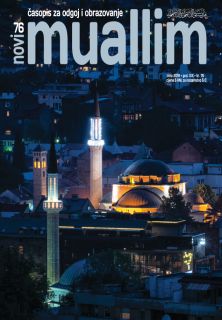RELIGIJSKI DRUGI I DRUGAČIJI U UČENJU I TRADICIJI ISLAMA
DOI:
https://doi.org/10.26340/muallim.v19i76.1686Ključne riječi:
dijalog, drugi, drugačiji, sljedbenici Knjige, komšijski ethosSažetak
UDK 2-67
28:21/29
U vremenu krize moralnih vrijednosti objavljene religije mogu doprinijeti izgradnji zdravog svjetonazora savremenog čovjeka i afirmaciji temeljnih ljudskih prava. Iako su objavljene religije u svojim konstitutivnim dimenzijama protiv nasilja, često su mobilizirane na planu ostvarivanja ciljeva koji su suprotni njihovom poslanju. Imperativ religijskim vođama u Bosni i Hercegovini je obnova “komšijskog ethosa”, egzistencijalnog obrasca koji je nastao na temelju svetih predanja objavljenih religija. Veliku poteškoću na planu izgradnje povjerenja među pripadnicima nacionalnih zajednica u Bosni i Hercegovini predstavlja aktivnost određenih pojedinaca i političkih struktura na planu afirmiranja “esencijalističkog multikulturalizma”, odnosno pluralizma “individualno homogenih” sebi dovoljnih monokultura koji je suprotan višestoljetnoj tradiciji suživota različitih religijskih, kulturnih i nacionalnih zajednica u bosanskohercegovačkom društvu i državi. Zadatak međureligijskog dijaloga tradicionalnih religijskih zajednica u Bosni i Hercegovini je obnova paradigme odnosno afirmiranje “progresivnog multikulturalizma” u čijoj osnovi nije samo toleriranje (trpljenje) različitosti nego i priznanje drugim i drugačijim prava na različitost, njihovo prihvatanje kao komparativne prednosti bosansko-hercegovačkog društva a ne nedostatka. Islamska zajednica u Bosni i Hercegovini je u periodima osporavanja i destrukcije prema drugom i drugačijem (dosljedna učenjima islama) stavljala se u njegovu zaštitu, štiteći ne samo ljudske živote, nego i njegove bogomolje i druge sakralne objekte. U bosanskohercegovačkoj historiji (bližoj i daljoj) brojni su primjeri koji predstavljaju paradigmu odnosa prema drugom i drugačijem koje je potrebno obnoviti.
Downloads
Objavljeno
How to Cite
Broj časopisa
Rubrika
License
Naknada:
a. Časopis ne naplaćuje naknadu za obradu članaka (APC) i naknadu za podnošenje članaka.
Autori koji objavljuju u ovom časopisu pristaju na sljedeće uvijete:
- Autori zadržavaju autorska prava i pružaju časopisu pravo prvog objavljivanja, pri čemu će rad jednu godinu po objavljivanju biti podložan licenci Creative Commons imenovanje koja omogućuje drugima da dijele rad uz uvijet navođenja autorstva i izvornog objavljivanja u ovom časopisu.
- Autori mogu izraditi zasebne, ugovorne aranžmane za ne-ekskluzivnu distribuciju rada objavljenog u časopisu (npr. postavljanje u institucionalni repozitorij ili objavljivanje u knjizi), uz navođenje da je rad izvorno objavljen u ovom časopisu.


